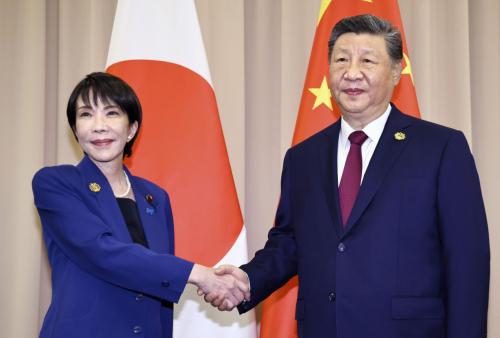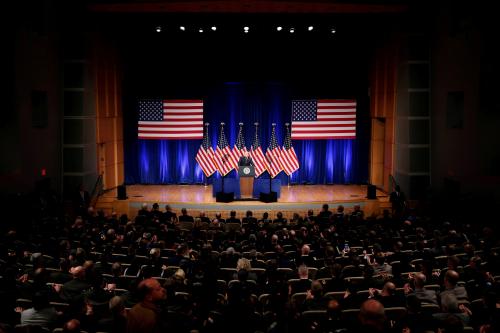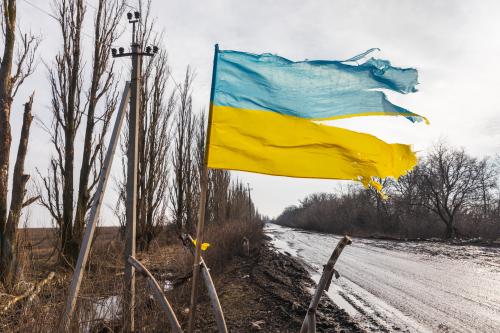Brookings experts examine the implications of the assault on the U.S. consulate in Benghazi and renewed unrest in Egypt and Yemen, exploring whether the Arab Spring has ushered in a new period of Islamist ascendency and resulting anti-American sentiment. Martin Indyk pays tribute to slain U.S. Ambassador Christopher Stevens, while Bruce Riedel focuses on possible al Qaeda links to the attack in Benghazi. Daniel Byman examines the demonstrations in Libya and protests in Egypt and Yemen, and Michael Doran details the emergence of a new Middle East order.
In Rememberance of Ambassador Christopher Stevens
Martin Indyk, Vice President, Foreign Policy
Chris Stevens was the ultimate foreign service officer. He reveled in his job. You only have to glance at his official photograph to get a sense of the character of the man: always cheerful, always enthusiastic, always professional. Like those more high profile ambassadors—Ryan Crocker (U.S. ambassador in Baghdad and Kabul) and Robert Ford (U.S. ambassador in Damascus)—Chris Stevens loved to be on the front lines of American diplomacy.
I remember when I was President Clinton’s Assistant Secretary of State for Near East Affairs and Chris was my Iran desk officer how he came to me to ask permission to start learning Farsi. We were just in the opening stages of an initiative to normalize relations with the newly-elected reformist President Khatemi, an effort which benefited greatly from Chris’s input and management. Chris told me that he wanted to be the first person on the ground in Tehran when we established diplomatic relations.
That effort didn’t work out so well, but I was not at all surprised to hear that Chris was the first American diplomat on the ground in Tripoli when the George W. Bush administration established diplomatic relations with the Qaddafi regime. Nor was it surprising that Chris became the liaison to the Libyan opposition and moved back to Benghazi to be the lead U.S. official on the ground during the effort to overthrow Qaddafi. It was therefore only fitting that he should become the first U.S. ambassador to the free republic of Libya.
The courage and determination that he demonstrated in Libya was typical of the man. He lived on the frontlines of U.S. diplomacy in the Middle East, and now he has died there on the frontlines in the pursuit of liberty – a great American has given up his life for a great American cause. May his memory be blessed.
Al Qaeda’s Libya Vengeance Plot
The Daily Beast
Bruce Riedel, Senior Fellow, Saban Center for Middle East Policy
Every year al Qaeda issues a statement on the eve of the anniversary of 9/11 in which its leadership provides a “state of the jihad” review of the global war on America and its allies. True to form this year, Ayman al-Zawahiri, the Egyptian amir of al Qaeda, released a message focusing on martyrdom and calling for attacks on Americans, especially in Libya. He may have hit the jackpot this time because of Islamophobia made in America.
Al Qaeda has used the anniversary of Sept. 11, 2001, for years to remind its supporters of the carnage it did that day and to promise more terror. This year al-Zawahiri focused his annual message on a discussion of the drone war and its impact. He eulogized a senior Libyan al Qaeda operative, Abu Yahya al-Libi, who was killed on June 4, 2012, in Pakistan.
Al-Zawahiri implicitly acknowledged the obvious: that al Qaeda’s core top leadership has been decimated by drone attacks and the SEAL mission that killed Osama bin Laden. But he also notes that the global jihadist movement has lost leaders for decades, some of whom have gone on to inspire generations of new jihadists. He specifically points to the Egyptian Sayyad Qutb, who was executed in 1966 by Gamal Abdul Nasser but whose writings inspired the development of the modern Islamic movement. And he mentioned a Palestinian, Abdallah Azzam, who encouraged Muslims around the world to fight the Soviets in Afghanistan, created the first al Qaeda group with bin Laden, and was killed in a car bomb in 1989. Qutb and Azzam are the formative heroes of today’s jihadist world.
Dangerous Consequences of the Arab Spring
Daniel Byman, Senior Fellow and Director of Research, Saban Center for Middle East Policy
The killing of Ambassador Stevens and three other Americans in Libya is brutal proof that the turbulence that has shaken the Middle East since the Arab Spring began has dangerous consequences for the United States. Libya, of course, is a country that the United States helped liberate from Qaddafi’s tyranny, and Americans understandably expected that gratitude, not murder, would be the result. Counter-demonstrations in Tripoli suggest that many Libyans remain thankful for U.S. support and oppose the violence, but the scale of demonstrations in Libya as well as large protests in Egypt and Yemen suggest that the region remains a dangerous place for Americans and that many people in these countries have a hostile view of the United States.
The collapse of authority in many countries has led to lawlessness. Dictatorship, for all its brutality and many faults, meant that American officials were not harmed by angry mobs—unless the government wanted the mobs to do so. Dictators fell, but strong regimes have not always taken their place. Power vacuums replaced tyrannies in Iraq, Libya, and Yemen. Should Assad go, Syria too will probably have a weak government at best. As a result, even a small group of militants can wreak havoc.
Compounding this problem, the staggering unpopularity of the United States gives political actors of all persuasions an incentive to bring American into the picture when they can use it to tarnish their rivals. Often opposition groups will do so, hoping that the governments will be forced to choose between their Islamist and nationalist credentials and their relationship with Washington.
So even when this latest crisis ends, anti-U.S. demonstrations and violence are likely to recur in the years to come.
Shaping a New Middle East Order
Michael Doran, Roger Hertog Senior Fellow, Saban Center for Middle East Policy
The old Middle Eastern order is rapidly crumbling and a new order is emerging, slowly and painfully. The key question is not whether the Arab Spring has made the world a more dangerous place but, rather, whether we are shaping the new order to the best of our ability.
In a period of revolutionary turmoil, it is easy to get distracted by the crisis of the moment. Today, our attention is focused on the assault on the American diplomatic missions in Egypt and Libya. These attacks certainly deserve the attention they are receiving from the highest levels of our government.
Amid the turmoil, however, we must remind ourselves that it is Iran—not al Qaeda and certainly not Salafism writ large—that represents the paramount strategic threat to the United States. This is so, because the Islamic Republic is a state sponsor of terrorism that is developing a nuclear weapons capability. In addition, it leads an alliance system, the self-styled “Resistance Bloc,” which is dedicated to undermining the influence of the United States, its Arab allies, and Israel.
The Arab Spring has deeply complicated the American-Iranian contest. It has, among other things, empowered new actors—such as the Muslim Brotherhood and the Salafis—who pose independent challenges to the authority of the United States.
As Washington contends with these, it risks losing sight of the fact that the major allies of the United States—the Israelis and the Saudis—do not actually believe President Obama when he says that he will prevent Iran from developing a nuclear bomb. Repairing this lack of confidence is the issue that should be at the top of the American agenda.
The Brookings Institution is committed to quality, independence, and impact.
We are supported by a diverse array of funders. In line with our values and policies, each Brookings publication represents the sole views of its author(s).



Commentary
Around the Halls: Has the Arab Spring Made the World a More Dangerous Place?
September 13, 2012